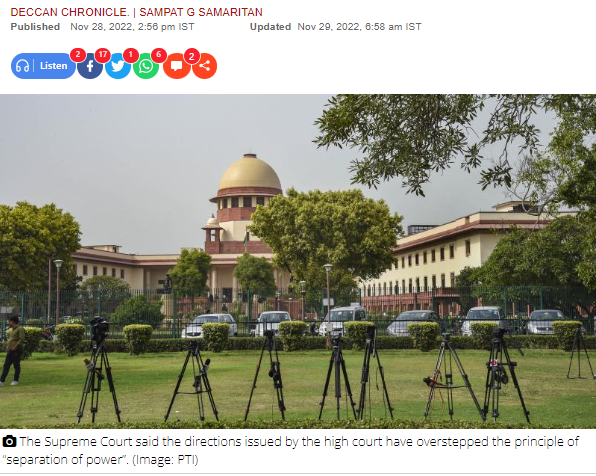SC stays AP HC’s order to develop Amaravati in 6 months

VIJAYAWADA: In a major relief to the Andhra Pradesh government, on its move to develop three capitals, the Supreme Court on Monday stayed certain directions in the recent AP High Court order, including the one that the state government develop the capital city in Amaravati in a time-bound manner.
A division bench of Justices K.M. Joseph and B.V. Nagarathna heard an special leave petition (SLP) filed by the AP government in New Delhi on Monday and fixed the next hearing of the case to January 31.
The court observed, “Direction 5 in the AP High Court order asking the AP government to construct and develop Amaravati capital city and capital region within six months’ time is unacceptable.” It asked, “What is the meaning of capital city?”
The court also asked how the AP High Court could become a town planner or a chief engineer, it having no expertise in such matters. Also, how could it ask the entire city to be developed in such a short period, the apex court asked.
The apex court opined that the High Court order was in the nature of an “advance ruling” wherein “it decided on the legislative competence to enact the legislation in the absence of any legislation on such matter.”
AP government’s counsel K.K. Venugopal submitted to the apex court that even as the Act on three capitals had been repealed, the High Court decided on legislative competence on three capitals. “This was nothing but an interference with the power of the legislature,” counsel said.
Counsel submitted that the concept of capital city was not mentioned in the Constitution of India. Capital city would mean a seat from where the government would function from any of its three branches.”
He submitted that, with due regard to the judiciary, the President would decide as to where its seat should be established as mentioned in the Constitution. “In the case of the executive, the government would decide this.”
The issue, he said, was not for the AP High Court to decide as it was not having the legislative competence to do so.
When the court asked as to where the AP government intended to set up its high court, the government’s counsel replied that it would be set up in Amaravati, and that it was already functioning in Amaravati.
He submitted to the court, “AP is having a temporary High Court. Out of the Rs 1,500 crore allotted, only a small amount was spent for its establishment.”
Counsel submitted to the court that the AP government was aggrieved at the timelines set by the High Court on developing the capital city in Amaravati. Counsel pleaded with the apex court to issue a stay on the High Court’s order and stressed the point that only the Centre carried with it the authority to decide on AP’s capital city.
The apex court said it wanted the matter to be heard fully before taking a decision on the plea.
Senior advocate Fali S. Nariman argued that if the parliamentary act mentioned that a particular place should be the capital, then the state would be having no competence to change it.
The apex court then observed that the parliamentary act did not mention that the capital city for AP should be located at Amaravati. The court said a sovereign state could not be bound to develop it at a particular place. The court wanted the state to decide on where it should develop its capital.
The senior advocate argued that as Parliament said that there ought to be one capital, there could not be three capitals.
Counsel for Amaravati Parirakshanan Samiti Shyam Divan submitted to the court that no development work was taken up in Amaravati in the last three years and no facilities like schools, roads were developed. He asked the state government to submit a realistic timeline to the AP HC if the ones issued by it earlier were found to be unrealistic.
Quotes:
I) Justice Nagarathna asked: “It appears that there is no canteen at the AP HC and with this, the members of the Bar and Bench have to return home in the afternoon. All amenities should be made available at the HC premises throughout the day so that the courts are not constrained to rise by afternoon.”
2) Justice Nagarathna asked, “Is there no separation of power in AP as to why its HC is acting as the executive? It is better to have more urban centres rather than concentrating attention on one place. It is for the state to decide and the AP HC overstepped.”
3) Justice KM Joseph said, “The law passed by Parliament has not said the capital shall be at a particular place. We cannot bind a sovereign state to a view that it has to develop the capital at a particular place only.”
4) SC stayed AP HC directions, in its stay order read from direction three to seven.







